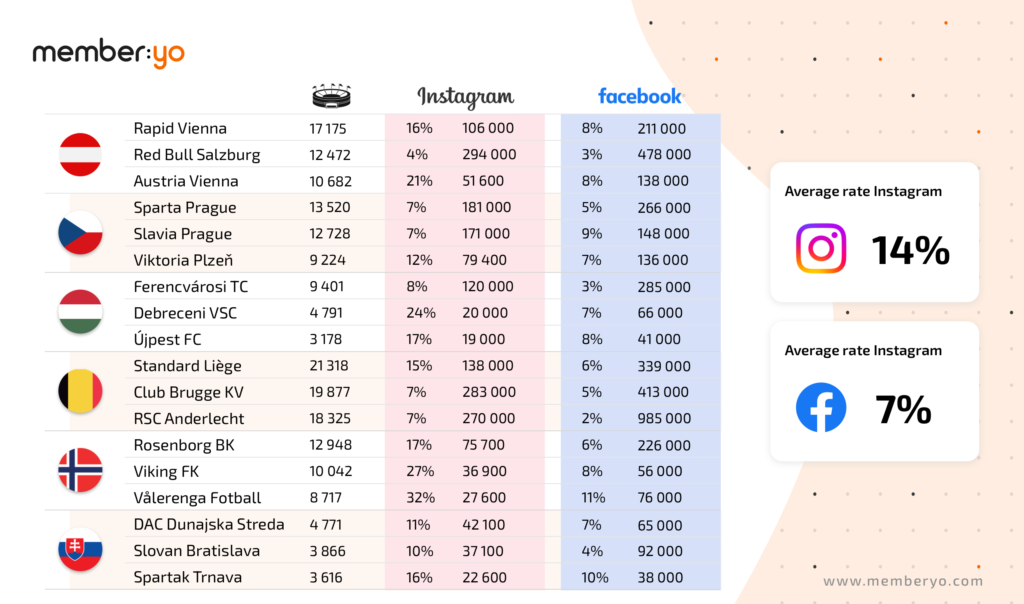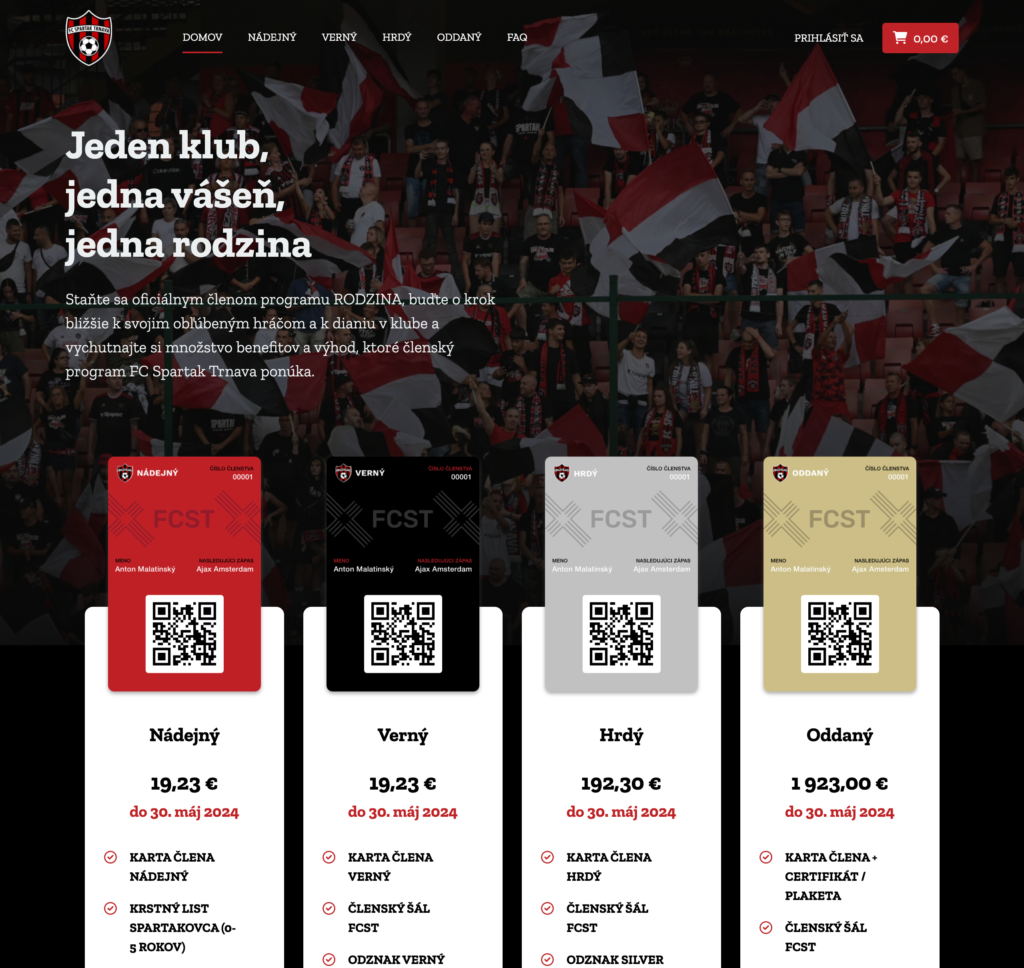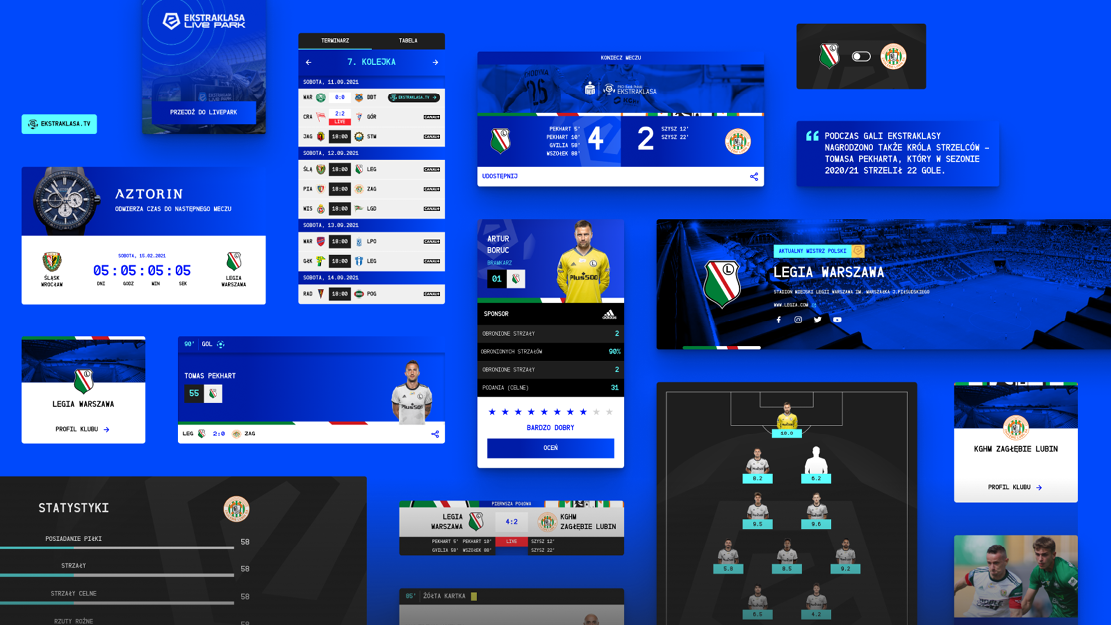In this episode of the Football Business Podcast, we spoke to Roman Krajniak, Co-Founder of Memberyo, and Pavol Bielik, Marketing Manager at Spartak Trnava. We explored why many football clubs can monetize only 7% of their fanbase, the importance of fan membership in a club’s business model, and how Memberyo helped Spartak Trnava overcome the typical challenges when setting up its membership platform.
Football clubs can monetize only from 7 % of their fanbase
At the Football Business Meetup in Bratislava, Roman Krajniak shared some findings from a research project that analyzed several football leagues, including Austria, the Czech Republic, Hungary, Belgium, Denmark, and Slovakia.
The research revealed that while clubs heavily focus on attracting fans to the stadium, they tend to neglect the much larger non-stadium fan base. Only 7% of their entire fan base is monetized, which is a very small proportion considering the potential revenue streams that exist in all businesses. Traditionally, clubs have relied on methods such as selling tickets, season tickets, and merchandise to monetize their fans. However, there are other revenue streams that they can tap into outside of stadium attendance.

Clubs claim to know “what to do”, but struggle with “how to do”
Lack of Resources – Pavol explained that his team had spent some years exploring ways to bring in additional revenue streams for their club. Despite trying various methods such as newsletters, emails, and social media, they still felt there was more they could do. In search of inspiration, they visited clubs in the Czech Republic and Austria to see what others were doing. They discovered that larger clubs with larger funding were able to develop their own mobile applications and establish direct communication with their fans through Fan IDs and other features. However, as a smaller club, Spartak Trnava needed an easier and more cost-effective way to implement such capabilities. Fortunately, a partner had recommended Roman and his team at Memberyo to assist them, as their main problem was financial resources.
Technology Gap – Roman added that when looking at the top clubs such as Juventus, Bayern Munich, and Manchester United, it’s clear that they have resources to build their own membership platforms and applications. They have the ability to build their own software teams with tens of software engineers to build in-house platforms. This investment in technology is a viable option for these big clubs. However, smaller clubs have been relying on third-party platforms like Facebook, Instagram, and other social media channels. While these platforms may be extremely helpful for smaller clubs, they do not own the data or the platform itself. In the event that the social media platform changes its policies or shuts down the account, the smaller club can lose all its followers without any means of communication. This is why the need for a cost-effective and no-code platform has arisen.
How can membership platforms also bring value to sponsors?
Pavol mentioned that they are still in the early stages of their journey and plan to conduct more analytics in the coming months. Still, he shared that they have been showcasing their platform to potential partners and received positive responses. For example, Spartak Trnava recently teamed up with a local Aqua park to offer fans special discounts and free tickets via the platform. He also believes that post-COVID, there will be more opportunities to partner with restaurants and entertainment businesses to benefit their communities and nearby cities.
Roman highlighted the changing landscape of sports sponsorship. Traditional approaches like having a brand logo on a jersey or a stadium are becoming less relevant and measurable. Instead, the real value of clubs, especially smaller ones, lies in their fanbase. This is why it’s important to create an ecosystem where the fan is at the heart of the club’s business model. For instance, in a small club with 2000 members, local sponsors can directly send targeted notifications with special offers to these fans. This approach generates real customers for the local sponsors, making it more effective than simply selling logos on the stadium. With the right tools, such as Memberyo, clubs can devise new benefits to offer sponsors. The more creative the club is, the more revenue it can generate
“It’s important to create an ecosystem where the fan is at the heart of the club’s business model” – Roman Krajniak
What is Memberyo and how exactly does it work?
The FBIN Business Network member Memberyo is a community and membership management platform that offers a unique digital fan card, which can be saved in Apple or Google Wallets. This card can be used as a fan pass, parking card, public transport card, ticket, and potentially even a cashless payment system in the future.
Roman also explained that what makes Memberyo stand out is that it allows fans to create their own levels of membership, such as membership for kids, young adults, regular fans, and senior people. The membership includes a mix of tangible and non-tangible benefits. For remote fans, such non-tangible benefits as content-based or experience-based are crucial. For example, clubs can offer faraway fans a chance to announce the roster for the match, which is something really special. The platform also has a communication feature that allows clubs to segment their fans and send specific information or notifications to each group. It also has a feedback feature that allows clubs to gather feedback from fans through surveys and voting.
Why small-medium-sized clubs can easily build their membership platforms with Memberyo?
No extra app needed – Roman noted that many fans are becoming frustrated with so many apps on their phones and are hesitant to download a new one. With Memberyo, there’s no need for fans to download a separate app because it uses native technology already built into Google, Android, and Apple devices. This eliminates the hurdle of acquiring users, especially if clubs have a white-label app. (Add Roman part: after separate apps…)
Low initiative investment and efforts – The platform is easy to set up and can be done within two weeks. All it requires is a small investment in the beginning, followed by variable costs based on the number of fans. This makes it a cost-effective solution for smaller clubs with limited resources. The membership program is available for all clubs, regardless of size. Even if a club sells only 100 memberships, it can still make a profit. The profit increases as the number of memberships sold increases. Therefore, the program is scalable and can benefit clubs with as little as 100 members, or as many as 10,000 members
How did Spartak Trnava’s fans react to the implementation of Memberyo?
Pavol and his team at the club have created guidelines to help older fans who may not be comfortable with mobile apps and wallets. Pavol shared that they were pleasantly surprised that even the older generation is becoming more comfortable with new technologies. During matches, many senior fans were found to be using these technologies with ease.
To enhance their fans’ experience, Spartak Trnava is also working with Memberyo to integrate mobile payment services with stadium payments. Small changes have already been implemented, like using the platform for small transactions, which have received positive feedback from fans. The club has also created special packages for fans, such as exclusive match experiences and gifts that are unique to the club.
The ultimate goal is to bring the club’s relationship with its fans to the next level. As the club continues its journey towards its 100-year anniversary soon, Pavol and his team are filled with hope and excitement to see how this project with Memberyo develops, with the goal of making it a significant achievement in the club’s history book.

More about Memberyo
If you’re looking to implement a membership program for your sports club or community, Memberyo can help. With minimal investment and no coding experience needed, any club can launch its own customized membership program in just a matter of days.
More about Spartak Trnava
Founded in 1923, Spartak Trnava is one of the most successful professional football clubs in Slovakia. This year, the club will be celebrating its 100th anniversary.






